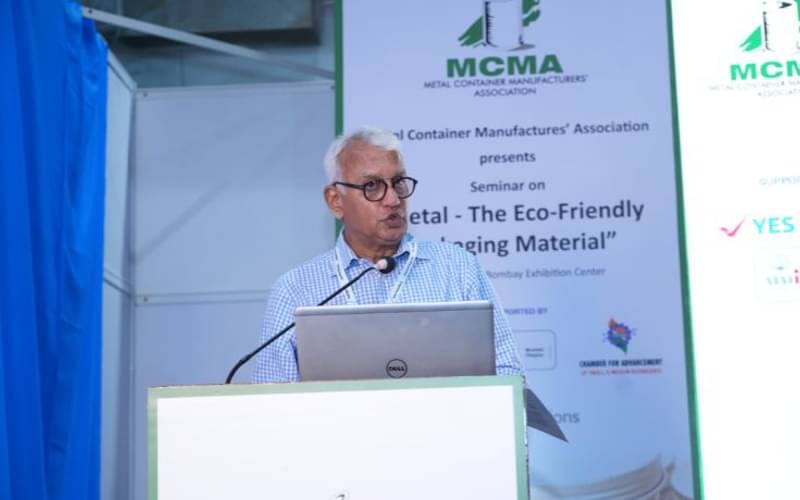Sanjay Bhatia spotlights metal as a sustainable packaging solution
At the seminar hosted by Metal Container Manufacturers Association (MCMA) titled Metal: The eco-friendly packaging during the PacMech exhibition at Bombay Exhibition Centre, Sanjay Bhatia, president of MCMA addressed the gathering
26 Jun 2023 | By Abhay Avadhani
“The packaging industry is growing at 15-17 % and the sector has the potential to create employment opportunities in the country,” Sanjay Bhatia, president of MCMA said. He called for the promotion of domestic players and setting up the packaging industry in every district on the lines of the one district one product initiative to create jobs at the local level.
Experts said that the packaging industry can facilitate the outreach of agricultural products to the market. This will increase farmers' income and cut farm production losses. Bhatia alluded to FSSAI’s data which said, one-third of all food in India is wasted or gets spoiled before it is eaten. According to the United Nations Environment Programme (UNEP) Food Waste Index Report 2021, household food waste in India is estimated to be around 50 kg per person annually, or 68.76 million tonnes.
Sanjay Bhatia said, “In financial terms the harvest and post-harvest losses of major agricultural and allied produce amount to Rs 92,651 crore yearly. This loss can be reduced with metal packaging, as it can preserve the flavour of food, prevent decay, and also help transportation.”
Bhatia spoke at length about sustainable development. He felt it meets the needs of the present without compromising the ability of future generations to meet their own needs. Warming to the theme, he said, “Eco-friendly packaging includes packaging that is easy to recycle and made from the material manufactured, using minimum impact on energy consumption or national resources.”
Bhatia’s definition of eco-friendly packaging is, “it is made from recycled materials.” He shared his eco-friendly mantra, “Refuse what you do not need; reduce what you do need; reuse what you consume; recycle what you cannot refuse, reduce, or reuse. Eco friendly products can reduce waste generation and promote the reuse and recycling of waste products.”
Sanjay Bhatia said, “One way to reduce waste generation is to ensure that resources and materials remain in the economy for as long as possible. Metal packaging also has one of the highest recycling rates 74.5% for aluminium cans and 82.5% for steel packaging.”
Bhatia added, “The metal packaging industry has put in place a range of initiatives aimed at significantly reducing greenhouse gas emissions, increasing reliance on renewable energy sources, such as wind and solar power.”
He said, “Over the past few decades, the global packaging industry has enjoyed healthy growth supported by several megatrends, which will continue to shape the business and we expect that two of them - sustainability and digital (particularly eCommerce) will create significant challenges for industry leaders.”
Sanjay Bhatia said, “Change often emerges gradually and then accelerates suddenly. The CEOs of the packaging companies must treat the higher volatility of their markets as a new normal in this era of transformational change.”
He signed off his address by saying, “Technological improvements in packaging techniques have led to the introduction of next generation packaging. Next generation packaging provides features such as traceability and offers product quality information. It is beneficial in tracing shipments to distant locations and ensures minimum damage to packaged materials. Moreover, adopting the QR code among various end-user industries is a significant trend in the market.”
The MCMA is a trade body composed of metal container manufacturers and traders looking after the needs of the consumers, creating awareness of sustainable packaging and taking up the issues of our fellow members with the government. As Venu Ayyar of MCMA said, “There were two black swan events. First there was Covid. This was followed by the BIS regulations. Both created a difficult situation for the metal packaging industry. This made metal packaging more expensive.”
Three eras of packaging
Three eras were identified by McKinsey & Company which has been characterised by major changes in consumer behaviour.
Era-one (2000-2009) - Substrate shift changes. This era saw continued increase of flexible packaging and rigid plastic to replace rigids such as metal, paper and glass.
Era-two (2009-2020) - Changing face of the consumer. This era began with the uncertainty and disruption of the great financial crisis. Towards the end of the period, awareness of sustainability rose significantly.
Era-three - Sustainability and the Digital transformation. The era of transformational change is upon us and the pace of change is accelerating rapidly. Sustainability and digital (particularly eCommerce) are the megatrends shaping this era.
Sanjay Bhatia said, “the packaging industry is still in the early stages of digitisation. Further it is expected to become a clear priority and an important value creation lever, particularly in the current context of volatile raw materials markets and increased protectionism and trade policies.”


